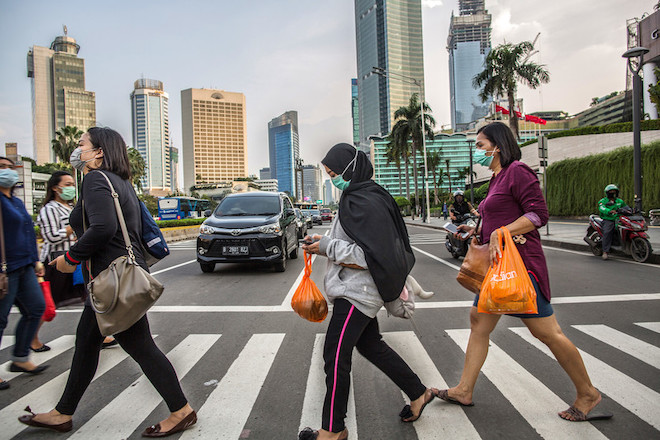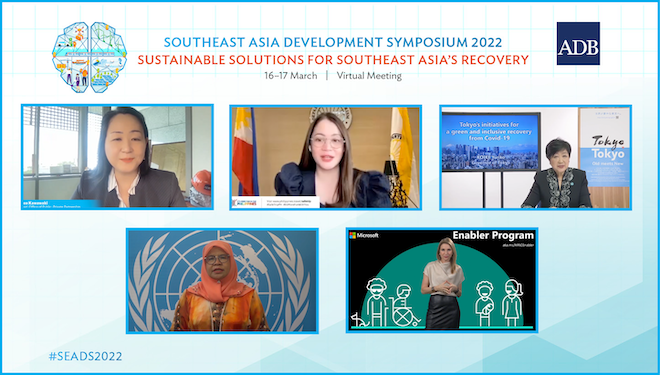
The coronavirus disease (COVID-19) pandemic has been tough on both Southeast Asia’s tourism and cities.
Tourist arrivals to the region plunged 82% in 2020 as mandatory lockdowns and border closures to stop the spread of the virus halted travel.
Cities did not fare any better. The United Nations Human Settlements Programme (UN-Habitat) reported that cities became the epicenter of the pandemic, with 95% of cases found in urban areas in the first months of the epidemic.
But amid these challenges, speakers at the recently concluded Southeast Asian Development Symposium (SEADS) saw opportunities to rebuild tourism and reimagine cities so they are more sustainable, inclusive, and less susceptible to shocks. ADB Head of Office of Public–Private Partnership F. Cleo Kawawaki highlighted the challenges facing both the tourism industry and cities during the event.
In her keynote, United Nations Human Settlements Programme (UN-Habitat) Executive Director Maimunah Mohd Sharif noted how the crisis has transformed many of the world's cities into pandemic hot spots, reversed many socio-economic achievements, and devastated labor markets, leading to adverse economic effects.
A new report from the Asian Development Bank (ADB), Southeast Asia Rising from the Pandemic, launched at SEADS noted that in 2021, the pandemic erased some 9.3 million jobs and pushed 4.7 million people in Southeast Asia into extreme poverty.
“To find sustainable solutions for Southeast Asia's recovery, cities will need to be adequately resourced so that they can be the engines of sustainable development,” said Maimunah.
She said municipal governments should assess, enhance, and deploy their revenue streams to make their cities more sustainable. “Cities need to demonstrate to the central government that they have a viable strategy for sustainable growth. Only then can they acquire the resources they need to achieve financial stability and boost investment in green recovery.”
UN-Habitat is ready to help cities prepare strategies which promote changes toward sustainable, resilient, climate-neutral and, equitable development, she said.

Reimagining a better Tokyo
Tokyo has been forced to reimagine itself in the wake of the pandemic. Tokyo Governor Yuriko Koike said that since the crisis started, the city has been accelerating measures so it does not return to life before COVID-19 but instead be able “to realize a city that is sustainable into the future.”
The plan has three pillars: green, digital, and inclusive.
Tokyo’s green initiatives address climate change. Koike said Tokyo has adopted a plan to reduce greenhouse gas emissions by 50% by 2030. Since more than 70% of Tokyo’s carbon emissions originate from old buildings, the city is now carrying out studies to introduce a scheme that will require certain new houses and other small- to medium-sized buildings to install solar power systems. It is also speeding up plans to develop a sustainable city model. Tokyo also plans to introduce hydrogen power which will be supplied through pipelines to homes, which when implemented will be the first for Japan. Tokyo plans to issue ¥40 billion ($335.56 million) in green bonds to finance the projects, she said.
Koike said deploying technology is also key to building Tokyo’s resilience to disasters. The city has started a project to create Tokyo’s digital twin by 2030. Under the plan, Tokyo will deploy technology to create the city’s digital replica, which can then be used to visualize congestion and plan for the city’s future.
Tokyo is also striving to be more inclusive. Koike said Tokyo has launched a network of female government and business leaders and plans to require organizations to increase the participation of women in decision making. The city is also set introduce a scheme recognizing sexual minority couples in the same way as married couples. The system is seen to promote understanding of the LGBTQ community.
Striving for a more sustainable Philippine tourism industry
The Philippines is also future-proofing its tourism industry. Tourism Secretary Bernadette Romulo-Puyat said the 6-year tourism development plan the government is currently drawing up aims to revive the sector and ensure the industry is more resilient against future crises. The pandemic provided the government an opportunity “to rethink tourism for the future,” she noted.
“The new plan must inspire a visitor experience that is richer, deeper, and more authentic while at the same time, more competitive, and more Filipino.”
One of the most immediate measures the department is working on is to restore jobs and livelihoods to tourism workers, who lost their jobs due the pandemic.
To make the industry competitive, Puyat said the Department of Tourism has validated more than 70 tourism circuits that highlight the best travel products and experiences around the country, including culinary, history, nature, wellness, agriculture, and faith-based. Another 49 circuits are being developed.
Health protocols are also being strictly enforced, she said. Guidelines are in place to ensure tourism stakeholders comply with the protocols and precautionary measures set by the World Health Organization. The government has also fast-tracked the vaccination of tourism workers, with 95% of its target already inoculated. In key destinations like Baguio City, Coron, El Nido, Puerto Princesa, Boracay, Davao City, and Bohol, among others, 100% of tourism workers have been vaccinated, while booster shots are currently being rolled out.
Puyat said one of the Department of Tourism’s flagship programs is to rebuild tourism to be more inclusive and resilient. She said the department is working with the Asian Development Bank to help communities transform toward resilient, inclusive, and sustainable tourism. This entails helping micro, small, and medium-sized enterprises in the sector widen their reach through online marketing, expanding sustainable consumption and production campaigns, and raising the skills capabilities and quality of their products.
The plan also entails increasing the participation of women and marginalized sectors in tourism development, promoting barrier-free tourism, and engaging local communities, including indigenous peoples’ groups in tourism development, especially in products such as slow travel and slow food.
The plan also entails developing awareness and education campaign materials, investing in market research and intelligence, conducting carrying capacity studies with other agencies, and studying conservation financing measures in nature-based sites. Visitor management programs aided by technology and digital solutions would also be developed along with raising the number of internationally recognized heritage sites and working with ASEAN for the inclusion of Philippine tours in its product packages for nature-based tourism.
“To fully attain a resilient inclusive and sustainable tourism industry we will formulate measures to address tourism risks and crises that will set emergency plans and provide guidance to the LGUs [local government units] and the private sector in preparing their crisis management plans based on UNWTO [United Nations World Tourism Organization] and ASEAN guidelines and business continuity plans,” Puyat said.
Preparing workers for the digital era
Microsoft Asia Pacific President Andrea Della Mattea underscored the need to skill workers as digital adoption continues to accelerate. “Fundamentally, we're moving to an era of digital, of cloud, of AI, and of ubiquitous computing—an era that will experience more digitization over the next 10 years than in the last 40 years.”
She said countries would need disruptors, visionaries, and futurists to remain at the forefront of global transformation. “Perhaps the biggest contribution that everyone can make for long-term societal improvement is developing skills and talent because it's people who drive digital transformation and skilling will be the currency for the post-pandemic world.”
Governments and industries need to ensure access to education training and technology, she said, citing that 65% of primary school children today will ultimately perform jobs that have not even been invented yet.
She noted Microsoft has launched digital skilling initiatives, working with customers like Grab and other partners to bridge the digital divide for drivers and their families. It also committed to skill one million people in Malaysia and 24 million in Indonesia. Together with its partners, Microsoft also strives to improve the employability of people with disabilities and address the gender gap in cloud, AI, and digital technologies through various programs.

